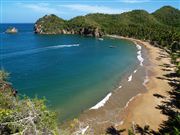A few weeks ago, in Valencia, one of our hosts offered to make us some cheese empanadas...dee-lish ! But when that evening came around, there were no empanadas to be seen, nor to be eaten. Sorry, she apologized, there was no oil in the supermarket.
The following two mornings, she repeated the offer, and each evening, we found out that there was no oil to be had in Valencia, the third largest city in the country. We never did get one of those homemade empanadas.
Who's to blame ? I'm pretty sure Chavez.
We spent three months in Venezuela. For three whole months, we had to endure Venezuela's anti-laissez-faire market politics in the supermarket. I´m definitely not a proponent of 100 % laissez-faire, preferring a mix of let-it-be and slightly-tinker-with-it. But in Venezuela, Chavez's plump hand wages a thumb war against the market's invisible hand and wins every time.
Any supermarket selling food at market level prices (gasp !) gets nationalized. So in the end, you have a handful of nationalized chains that sell only the essentials, such as corn flour, rice, and...and...and to come to think of it, I can't remember anything else in those stores ! They sell those few products dirt cheap, and the poor wait in line for those basics for two hours. Then you visit the other supermarkets, that aren't nationalized, and you find prices the same or higher than in Europe or the States (we're talking about a country with nearly 30% inflation). So technically there is a choice : wait in line all day to buy the basics, or spend half your salary if you want your food to have any flavor.
But the one thing that's certain is that because of all of the price-fixing, many products that I consider more-or-less essential are conspicuously absent : could be milk this week, oil next week, and wheat flour the following week. And forget about products deemed exotic ! You want couscous, go to Algeria !
So it was with great pleasure that we walked into our first supermarket upon returning to Colombia. Its shelves were overflowing with reasonably-priced products from Colombia and beyond. Normally I try to spend as little time as possible shopping, and grocery shopping is no exception. But here, in post-Venezuela Colombia, everything's different...we take our time, we visit the same aisles over and over, we dream about the concoctions we could create in the kitchen.
And for the past week, we've been in the kitchen non-stop, preparing some of our favorite recipes, and learning a few new ones. Believe me, they're so much tastier when you actually have spices and don't have to replace half of the main ingredients.
The following two mornings, she repeated the offer, and each evening, we found out that there was no oil to be had in Valencia, the third largest city in the country. We never did get one of those homemade empanadas.
Who's to blame ? I'm pretty sure Chavez.
We spent three months in Venezuela. For three whole months, we had to endure Venezuela's anti-laissez-faire market politics in the supermarket. I´m definitely not a proponent of 100 % laissez-faire, preferring a mix of let-it-be and slightly-tinker-with-it. But in Venezuela, Chavez's plump hand wages a thumb war against the market's invisible hand and wins every time.
Any supermarket selling food at market level prices (gasp !) gets nationalized. So in the end, you have a handful of nationalized chains that sell only the essentials, such as corn flour, rice, and...and...and to come to think of it, I can't remember anything else in those stores ! They sell those few products dirt cheap, and the poor wait in line for those basics for two hours. Then you visit the other supermarkets, that aren't nationalized, and you find prices the same or higher than in Europe or the States (we're talking about a country with nearly 30% inflation). So technically there is a choice : wait in line all day to buy the basics, or spend half your salary if you want your food to have any flavor.
But the one thing that's certain is that because of all of the price-fixing, many products that I consider more-or-less essential are conspicuously absent : could be milk this week, oil next week, and wheat flour the following week. And forget about products deemed exotic ! You want couscous, go to Algeria !
So it was with great pleasure that we walked into our first supermarket upon returning to Colombia. Its shelves were overflowing with reasonably-priced products from Colombia and beyond. Normally I try to spend as little time as possible shopping, and grocery shopping is no exception. But here, in post-Venezuela Colombia, everything's different...we take our time, we visit the same aisles over and over, we dream about the concoctions we could create in the kitchen.
And for the past week, we've been in the kitchen non-stop, preparing some of our favorite recipes, and learning a few new ones. Believe me, they're so much tastier when you actually have spices and don't have to replace half of the main ingredients.















